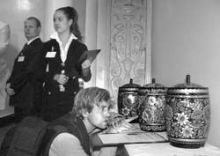The second week of gossip is swirling around the charitable auction that took place in Kharkiv on Nov. 19. The most interesting lots were kegs of honey from Viktor Yushchenko’s apiary and 18th-century decorated and painted shallow washtubs from the Ukrainian president’s personal collection. These items generated much publicity for the auction, attracting a large number of philanthropists. The president’s lots accounted for a large part of the auction proceeds. Now Yuriy Yanko, the director and conductor of the Kharkiv Philharmonic, does not have to worry about finding money for the renovations of the building he manages.
The building that houses the Philharmonic dates from 1892. Its architectural ensemble is Kharkiv’s cultural and historical gem. Tchaikovsky and Rachmaninoff appeared here, as did Shaliapin in his debut performance in Kharkiv. The Italian operatic singer Mattia Battistini and many other stage celebrities included the Philharmonic in their touring schedule. Unfortunately, the building has been in disrepair for the past few decades. After his recent trip to Kharkiv, during which he visited the Philharmonic, President Yushchenko said that “to renovate and restore the building would be an honor for the city’s business community” and gladly agreed to provide lots for the future auction to raise money for the Philharmonic. According to the reconstruction plan, the collected funds will be used not only to renovate the grand hall, but also to build a new organ chamber. For the past 25 years the Kharkiv organ has stood in Assumption Cathedral. Several years ago the cathedral was transferred to the Orthodox Church, and the city fathers and the managers of the Philharmonic have faced the painful question of returning the Catholic musical instrument to the Philharmonic.
Because the objective was to collect as much money as possible, the organizers chose a very unusual auction method. It was conducted without the rap of the auction hammer, competition among buyers, or disclosure of bids. It was a silent auction. Each buyer could look up the others’ bids for each of the 18 proposed lots and try to outbid the highest bidder. No matter whose bid won or lost, everybody who signed up for lots and entered bids had to donate the corresponding amount to the philharmonic’s reconstruction fund. The auction organizers were betting on the guests’ philanthropic generosity in the hopes of collecting as much money as possible. The event was more like a high society function. The guests mingled, letting champagne loosen their purse strings, and were in no hurry to submit their bids. Apparently they were waiting for others to scribble down their figures so they could offer a larger sum for their lot of choice. They did so in order not to underbid and get nothing for their money. In the final minutes of the 40-minute auction the most patient bidders grabbed pens to submit their figures. Three kegs of honey from Viktor Yushchenko’s apiary found three owners, who together offered 2,640,001 hryvnias. A map of Kharkiv from 1875, donated by the president’s nephew Yaroslav Yushchenko, fetched 530,000 hryvnias. Parliamentarian Oleksandr Feldman handed over 100,000 hryvnias for a simple handmade toy representing a chicken character from a Ukrainian folk tale. The lots donated by officials and philanthropists included a soccer ball signed by Oleh Blokhin and an illustrated chronological reference book of the Dynamo Kyiv soccer club, containing the players’ autographs, which was published in time for the club’s 70th anniversary. The two lots netted 280,000 hryvnias. Fam Viong, the ambassador of the Republic of Vietnam, paid 500,000 hryvnias for a painting by Nina Verbuk. Parliamentarians Dmytro Sviatash and Rozalia Haliyeva donated 200,000 hryvnias in addition to the collected amount. Parliamentarian Anatoliy Hirshfeld donated certificate worth UAH 100,000 for the purchase of musical instruments and a car for the Kharkiv Philharmonic. The auction raised a total of 7,883,712 hryvnias (US $1.5 million).







